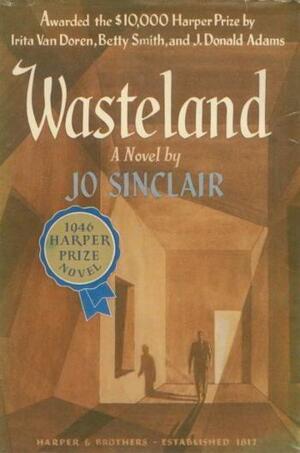Ruth Seid wins prize for novel "Wasteland"
Ruth Seid, writing under the ethnically neutral and gender-ambiguous pen name Jo Sinclair, won the $10,000 Harper Prize for new writers on January 2, 1946. Seid had supported her writing through the generosity of a personal patron, sharing her $10 a week stipend with her parents, Russian immigrants living in Cleveland.
Like most of Seid's later fiction, Wasteland centers upon questions of Jewish and gender identity. The novel's main character is a Jewish photojournalist who passes as a gentile in order to gain social and professional acceptance. As Seid presents the photographer's attempts to understand his relationship to his immigrant family, Seid explores her mixed feelings about her Jewish identity and her own family. The book's sympathetic portrayal of the photographer's apparently lesbian sister further explores central questions of identity and belonging that reflected Seid's own experience.
When she won the Harper prize, Seid was already hard at work on a second novel. In this and her later works, she consistently focused on the theme of oppression in its many forms: anti-Semitism, racism, Jewish self-hatred, poverty, homophobia, and marginalization. Her most well-known novel, The Changelings, depicts a Jewish neighborhood in the process of becoming an African-American neighborhood. It takes the long history of Jewish oppression as a touchstone for exploring the prejudice faced by African Americans. Published in 1955, The Changelings won the 1956 Jewish Book Council of America annual fiction award, and was also nominated for a Pulitzer Prize.
Seid later published several more novels and a memoir, The Seasons: Death and Transfiguration (1992). Growing scholarly and popular interest in women's and ethnic literature in the 1980s and 1990s has revived interest in Seid's work. She died in 1995.
Sources: New York Times, January 3, 5, 1946; Jewish Women in America: An Historical Encyclopedia, pp. 1262-1263.



